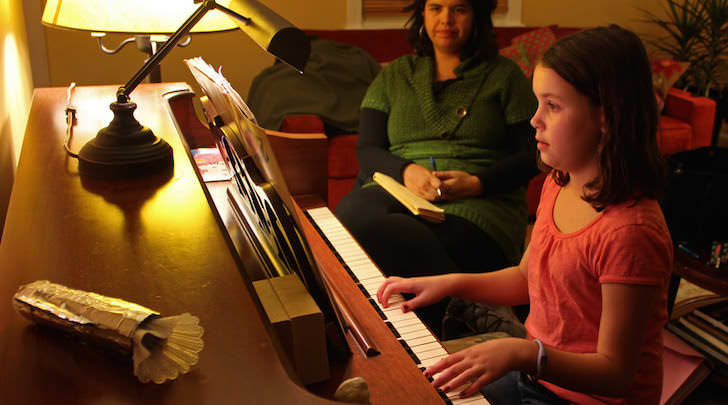
Not Just Another Activity.
by Jamey Mann, Catoctin School of Music
It is too often that clients sign up for music lessons without really understanding what a commitment it is. For a student to be successful the client must be ready to commit time and money to get the full benefit. Those who view music lessons as just another temporary activity, misunderstand the impact music could have in their lives. However, those who are ready to make the commitment will reap lifelong benefits.
Music lessons should not be viewed as just another activity. An example of this are students that sign up for summer (only) music lessons. The whole idea of this is non-committal from the start. Three months of lessons (minus 1 or 2 weeks for vacation/illness) is barely scratching the surface for many instruments. Furthermore, it is highly unlikely that a student will retain any knowledge of those lessons going forward. They will get a taste for music, but for many students, framing that taste with an end date of 3 months, negates any future with that instrument as it’s just not long enough to form a solid relationship with music.
If we take the guitar for an example (one of the most inexpensive instruments to get started) the costs are somewhat staggering for a summer activity. A good quality guitar costs $300+, $60+ for other materials (footstool, music stand, tuner, method book, etc.), and 3 months of lessons $450. While a little over $800 (prices may vary) may not seem like a huge expense, many students will not retain anything from those lessons. Learning music is like learning another language. It takes years of consistent practice and application to utilize it.
Therefore, I encourage clients to view music lessons as a commitment than a temporary activity. If students understand this from the start, they have great chances of success with that instrument. The level of success will be different for each student. I am not teaching so each student becomes a world-famous virtuoso, that is not realistic. Success for me is my students continued dedication and enjoyment of the instrument.
The following are tips to help get started with the correct mind set.
- Plan and start Talking – Before signing a student (or yourself) for lessons take a realistic look of how much time and money you must allocate towards lessons and practice. If you are the type of person that is completely booked every day of the week maybe wait until things calm down. If you are signing up a child, you must speak to them about what practice is and that they need to be able to practice every day. The younger the child is the more the parent will have to be involved with practice. They must also be sure they have time to practice with them.
- Try things out – Many music schools offer trial periods for parents and kids to see if things will work out. This is a great time to try out different instruments and teachers to find the right fit. It is important to be clear with the school that you are just trying to figure what you or your child likes before purchasing and instrument or signing up for a few months of lessons. This can save valuable time and money.
- Research Schools and Teachers- When researching teachers and schools do not be afraid to ask questions about experience, education, and teaching methodologies. You want to be sure you are seeing the same teacher every week and that teacher has a sound method for teaching.
- Stay with it – Inevitably there will be hard times ahead. There will be times when you or your child will not want to practice. You will feel at times that you are not making progress and want to quit. Resist that urge to quit and keep going. Learning an instrument is a crooked uphill progress. There are times when you will make huge leaps then hit a roadblock that you have to work through.
There is also the possibility that music is not for you or your child. Which is completely fine! However, there are many other disciplines such as art, theater, sports, martial arts, etc. that require the same amount of dedication and study. I strongly suggest these tips be applied to all disciplines so your student can get the most out of them.
